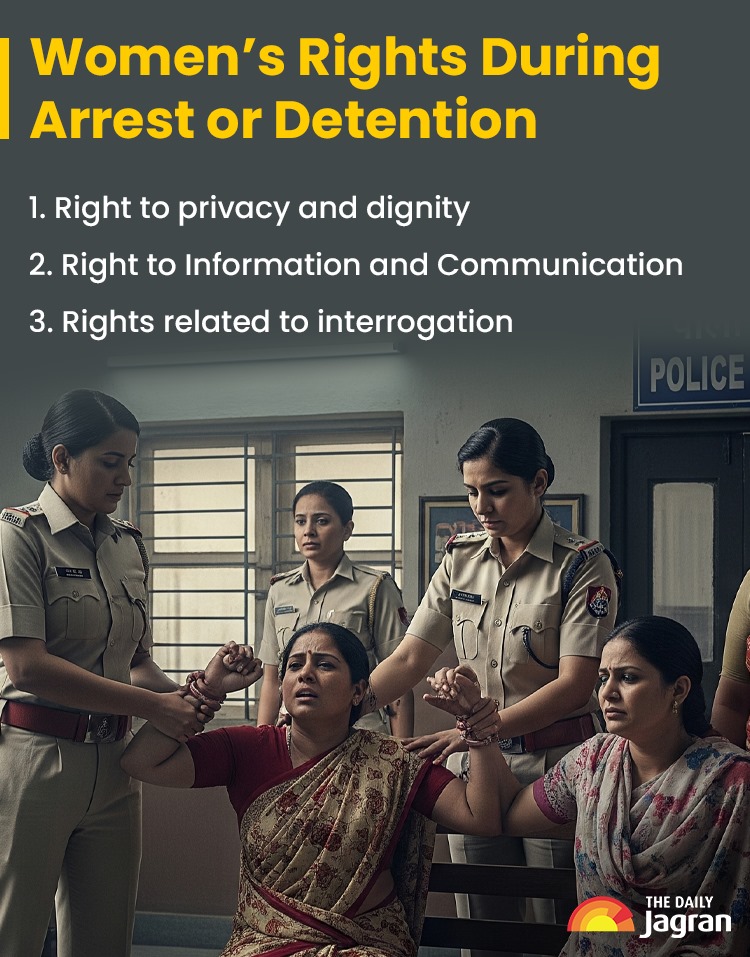- By Priyanka Koul
- Fri, 05 Sep 2025 06:34 PM (IST)
- Source:JND
It’s My Right: In today’s world, where laws change faster than ever before and new laws are introduced regularly, it is of utmost importance to be aware of and be updated about the laws that affect your everyday life.
When it comes to the law, things can often feel confusing and intimidating especially on topics as sensitive as the arrest and detention of women. But understanding these laws is really important because they’re designed to protect the rights and dignity of women during some of the most challenging moments in their lives. In India, there are specific rules and safeguards in place to ensure that women aren’t just treated fairly but also with respect and care when they’re taken into custody.
ALSO READ: It's My Right: Everyday Laws That You Should Know
Most of us don’t like to think about getting arrested or detained, it’s not something anyone wants to imagine happening to them. But the truth is, no one is completely immune to it under the law. When it comes to women, though, the Indian legal system takes extra care. There are special rules in place to protect privacy, basic rights, and dignity during arrest and detention. So, if you want to understand what these laws are all about and what rights women have in these situations, keep reading I've got you covered.
To make it easier, I spoke to Advocate Mohini Priya, Advocate on Record, Supreme Court of India and Advocate Shiv Pratap Singh, Children and Women’s rights Lawyer, Delhi.
1. When Can A Woman Be arrested or Detained?
- Section 43(5) of the Bharatiya Nagarik Suraksha Sanhita (BNSS), 2023 and section 46(4) of Criminal Procedure code 1973 state that women cannot be arrested after sunset and before sunrise except in exceptional circumstances.
Recommended For You
Even during these ‘exceptional circumstances’, a female police officer must obtain written permission from a first-class judicial magistrate before the arrest by explaining why the arrest cannot be delayed until permissible hours.
- As per Section 43(1) of the BNSS, where a woman is to be arrested, her oral submission to custody is enough and it is presumed that she has submitted once informed, so there is usually no need to physically touch her.
- Further, A male police officer cannot touch a woman while making an arrest, unless circumstances require it (for example, if she resists or attempts escape), or the officer
is a female police officer.
- Although, in rare situations, an arrest might still occur if the reasons for the arrest are quite strong and justifiable. The Madras High Court recently clarified in the case of S. Salma vs. State of Tamil Nadu, that these provisions are "directory" rather than mandatory, which means that such an arrest won’t be illegal if the actions are well justified.
ALSO READ: Law Minister Launches ‘Media Law and Ethics’ Book, Discussing Media Freedom In AI Era
2. Presence of Female Police Officers – Is It Mandatory? In What Capacity?
- As per Sec. 43 of BNSS and Section 46(1) of the CrPC, the following exceptions apply while arresting a woman:
a) A woman can only be arrested by a female police officer.
b) A male police officer shall not touch the body of a woman to make her arrest.
c) No woman shall be arrested after sunset and before sunrise.
- As per Sec. 43 (5) of BNSS, in exceptional circumstances, a woman can be arrested by a Woman Police Officer after obtaining an order from the court within whose local jurisdiction the offence is committed or the arrest is to be made. (Section 46(4) of CrPC)
The importance of this is such that it prevents harassment and ensures that the woman’s privacy, modesty, and dignity are not violated during custody or investigation.
3. Place Of Detention - Can A Woman Be Detained In A Regular Police Station?
- If a woman is lawfully arrested, she can be taken to a police station, but not kept in a common lock-up with men.
- As per Sec. 46(4) CrPC / Sec. 43(5) BNSS, Arrest of women after sunset and before sunrise is barred overnight detention in police stations is not encouraged.
- If absolutely necessary, with prior Magistrate’s permission, the woman must be kept in a separate, safe lock-up with female staff on duty.
Sheela Barse vs. State of Maharashtra (1983) judgment established that police officers must ensure that arrested females are completely segregated from men. Women must be supervised exclusively by female police personnel during detention.
4. What Are The Rights Of A woman During Detention or Arrest?
Everyone has the right to engage or seek a legal practitioner in these situations to but following are some additional rights that are important to know about:

- Right to privacy and dignity
Only a female police officer can search women. Male officers are completely prohibited from conducting physical searches of women, no matter what the circumstances are. These physical searches must be conducted with decency and privacy.
The Bharatiya Nagarik Suraksha Sanhita (BNSS), 2023 strengthens protections for women in arrest and detention:
i. Entering a Woman’s Home (BNSS Section 44(2))
If police need to enter a house/apartment occupied by a woman who, according to custom, does not appear in public-
- They must first give her notice that she can withdraw.
- Police must provide her every reasonable opportunity to leave privately before entry.
ii. Search of a Woman (BNSS Section 49(2)):
- If a woman needs to be searched, it must be done only by another female, and always with strict regard to decency.
- Male officers cannot search women under any circumstance.
iii. Medical Examination of Women (Section 51(2) & 53(1), BNSS)
- Section 51(2): If a woman’s body needs to be examined, it must be done only by, or under supervision of, a female registered medical practitioner.
- Section 53(1): If a woman is arrested and a medical examination is required (e.g., in rape cases), it must be carried out only by a female medical officer or, if not available, a female registered medical
practitioner.
- Right to Information and Communication
The woman must be informed of her right to have someone notified about her arrest. Police must inform the woman's nominated family members, relatives, or friends, whoever is available about the arrest and detention location immediately
As per Section 48(1) of BNSS (Section 50A of CrPC), every police officer making arrest must provide the information regarding such arrest of a arrested person and place where the arrested person is being held to any of his
relatives, friends or such other persons as mentioned by the arrested person.
- > The information must also be given to the designated police officer in the district for the purpose of giving such information and also to the designated police officer in the district.
- > Further, as per Section 48(2) of the BNSS, the police officer shall inform the arrested person of his rights under sub-section (1) as soon as he is brought to the police station.
- Rights During Interrogation: What Is Allowed And What Is Not?
A woman cannot be called to the police station under any circumstances for interrogation at any hour. The police must visit the woman at her residence along with a female constable, ensuring her family and friends are present during the interrogation unless she wishes to speak in private.
Secondly, it is illegal to detain a woman for more than 24 hours without being produced before a magistrate. For extended detentions, regular medical examinations must be conducted every 48 hours to ensure her well-being.
What is Allowed?
- Women cannot be called to the police station for interrogation before sunrise or after sunset.
- Interrogation should happen during daytime only, unless a Magistrate permits otherwise.
- If the place of Interrogation is conducted at a police station, it must be in the presence of a female officer.
- A woman police officer should be present throughout questioning.
- Right To Silence
As per Nandini Satpathy vs P.L. Dani (1978), no woman (or man) can be forced to answer questions that may incriminate her. She can remain silent on self-incriminating questions.
- Right to Legal Aid
She has the right to consult a lawyer during interrogation.
5. What is a Red Flag (Unlawful or Abusive)
- Being called to a police station at night without Magistrate’s permission.
- Interrogation conducted without a female police officer present.
- Any form of physical violence, intimidation, or verbal abuse.
- Forcing a woman to sign blank papers or confessions.
- Denying her access to a lawyer or family communication.
- Keeping her in prolonged interrogation without rest, food, or water.
Advice For Young Women: What Should they keep in mind if ever in such a situation?
Know our rights! You cannot be arrested or detained after sunset and before sunrise under normal circumstances. A female police officer needs to conduct the arrest. The interrogation has to be at or near your residence with your family and/or friends present. You have the right to inform a trusted person about the arrest.
1. Stay Calm & Aware: Don’t panic. Politely but firmly assert your rights.
2. Request to know the reason for arrest and see the arrest memo.
3. Insist that a female officer be present for arrest, search, or questioning.
4. Inform Someone Immediately- Make sure family or friends are informed. Police are duty-bound to do this.
5. Don’t Sign Blindly - Never sign blank papers or confessions without understanding them or without legal advice.
6. Know Your Rights - You cannot be interrogated at night or searched by a male officer.
7. Seek Legal Help - You can demand immediate access to a lawyer as guaranteed under Article 22(1) of the Constitution. Ask for a lawyer’s presence if you feel pressured or unsafe. If you are unable to afford a lawyer, request free legal aid services which the state must provide free of cost.
Knowing these rights, you can navigate these challenging situations with confidence and dignity.
(Disclaimer: This article is part of the series 'It's My Right'. The views expressed in the article are for informational purposes only and do not constitute legal advice. To read more articles in the series, click here)




-1762924998307_m.webp)

